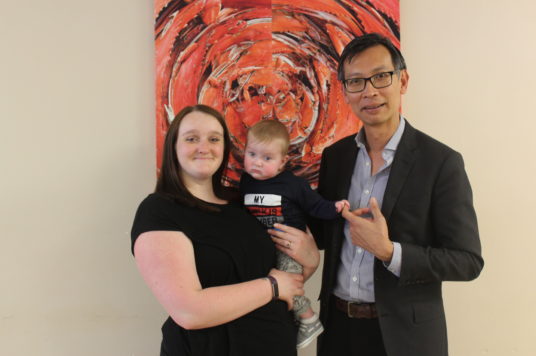Patient with rare genetic condition thanks St George’s for ‘miracle son’
A woman with a rare genetic condition has given birth to a healthy baby boy against the odds.
Lauren West, 23, was diagnosed with Fanconi anaemia – a severe congenital aplastic anaemia otherwise known as bone marrow failure – when she was seven years old after it was detected in her younger sister, Holly, when she was born.
Fanconi anaemia is a complex inherited genetic condition that occurs in 1 in 160,000 individuals worldwide. It is predominantly a blood condition, but can affect the whole body including development of other tumours and also cause fertility difficulties.
Lauren underwent screening and was diagnosed when she was seven years old but waited until she was 16 years old to undergo a bone marrow transplant as she didn’t experience any physical symptoms.
She received her bone marrow transplant from her older sister Steph, who doesn’t have the condition, in January 2012 alongside having chemotherapy during a four week stay at St George’s. Receiving a transplant from a tissue-matched sibling without the condition has been proven to carry the best results in recovery.
While Lauren recovered well from her treatment, one of the challenges with Fanconi anaemia and also post-transplant is that it can make conceiving difficult. For those with fanconi anaemia, the chance of having a baby is just 15% which is further reduced after having a bone marrow transplant to less than 8%.
Dr Mickey Koh, Consultant Haematologist, led and worked with a multidisciplinary team from across St George’s to help and advise Lauren when she wanted to have a baby with her partner, Ian Gasson.
In early 2018, she successfully conceived without intervention and continued to have regular check-ups with medical genetics and high risk obstetric teams led by Dr Ingrid Watt-Coote at St George’s to ensure that both she and baby were doing well. On 22 October 2018, Lauren gave birth to a healthy baby boy, Alexander, without complications.
Dr Mickey Koh, Consultant Haematologist and Clinical Lead for Stem Cell Transplantation at St George’s said: “I’ve known Lauren since the beginning of her diagnosis and it has been wonderful to see her successfully navigate this journey from having a successful stem cell transplant during her adolescence and recovering from that to now having a healthy baby.
He added: “She is currently off all medication from her transplant and the blood condition has been successfully cured. Her bone marrow is now effectively 100% donor.”
Lauren, who lives in Lingfield near Gatwick, said: “I am so grateful for all the care given at St George’s, particularly by Dr Koh but from all the teams involved in mine and Alexander’s care. Ian and I are so blessed to have our miracle son – we have the family I never thought I would have. I am so thankful!”
Professor Sahar Mansour, Consultant in Clinical Genetics at St George’s who screened and diagnosed Lauren, said: “Making an early diagnosis has led to prompt treatment including finding a safe and suitable donor in Lauren’s sister, which in turn has led to a healthy baby boy – it’s fantastic news!”
Dr Koh explained: “What is particularly impressive is the multidisciplinary approach needed to manage a complex patient with an inherited condition like Lauren. Through her treatment from diagnosis, there has been multi-disciplinary personalised care provided by the various specialities at St George’s.
He added: “We’re very fortunate to have a full complement of ancillary supportive specialties at St George’s who provide invaluable support to our stem cell transplantation team and who understand the intricacies of the conditions our patients have, to be able to support them across all services. This not only includes the medical genetics and obstetrics during Lauren’s pregnancy but also the respiratory medicine, medical psychology, physiotherapy, dietetics, laboratory and clinical nurse specialist support during her transplant.”
Photo caption: Lauren, Alexander, Dr Koh
Notes to editors
Additional notes:
- fertility is already reduced in patients with Fanconi Anaemia (FA) as it is a rare condition
- pregnancy can pose problems with increased complications including higher rates of caesarean sections
- traditional bone marrow transplants using radiotherapy largely result in much reduced fertility
- modern day transplants for FA and other bone marrow failure conditions take these into account – in fact, it is critical in FA as they are more susceptible to the toxic effects of chemotherapy and the transplant
For media enquiries, please contact Pippa Harper, Media Manager, via philippa.harper@stgeorges.nhs.uk or 020 8266 6128.



